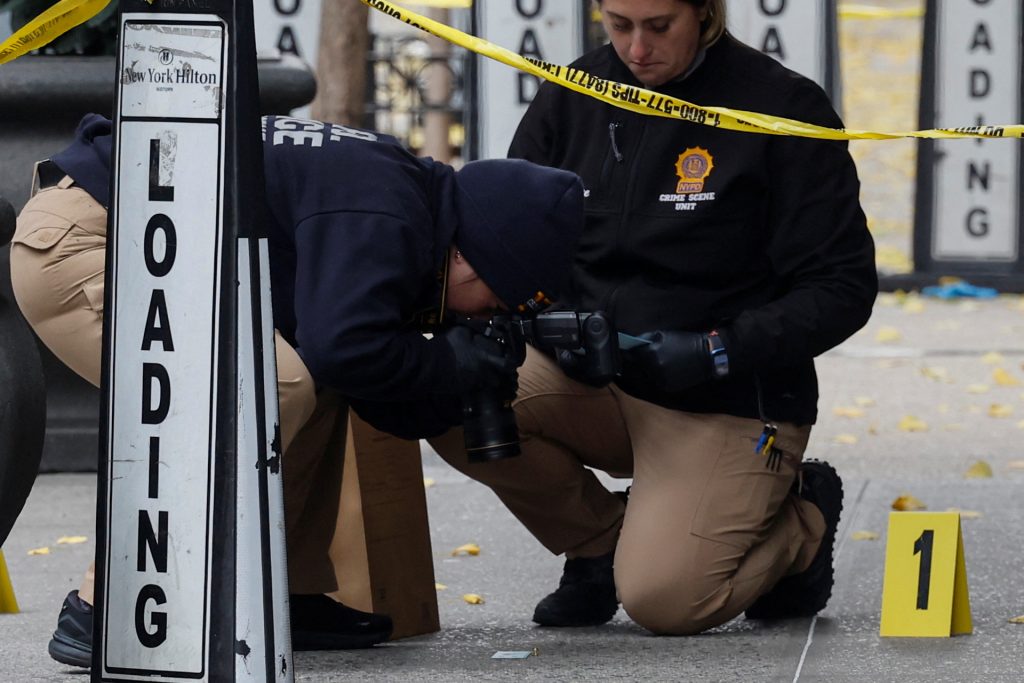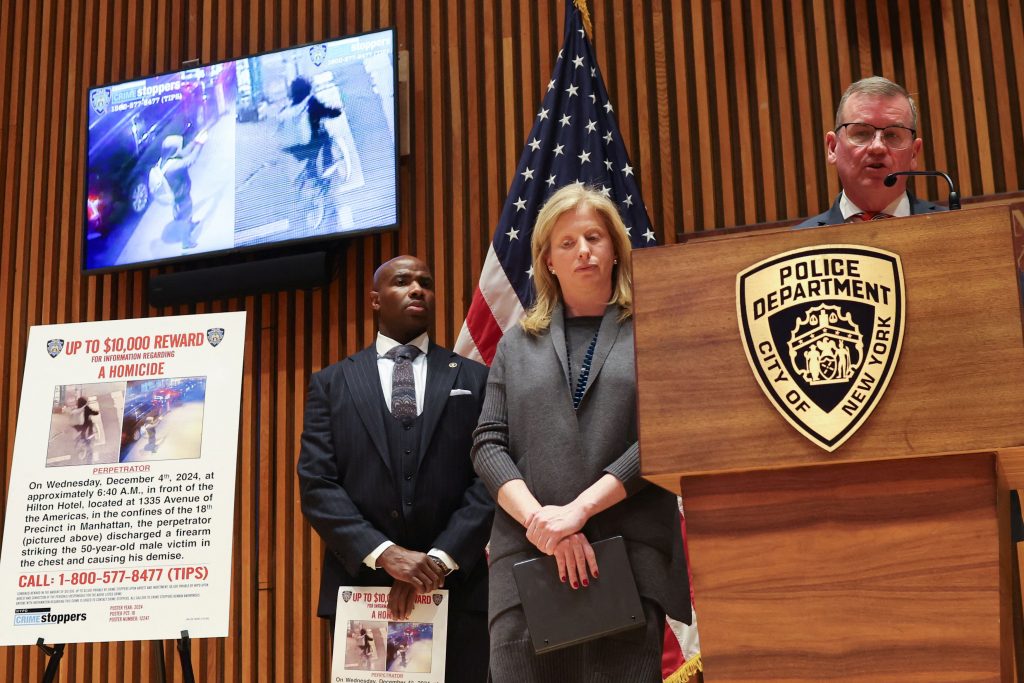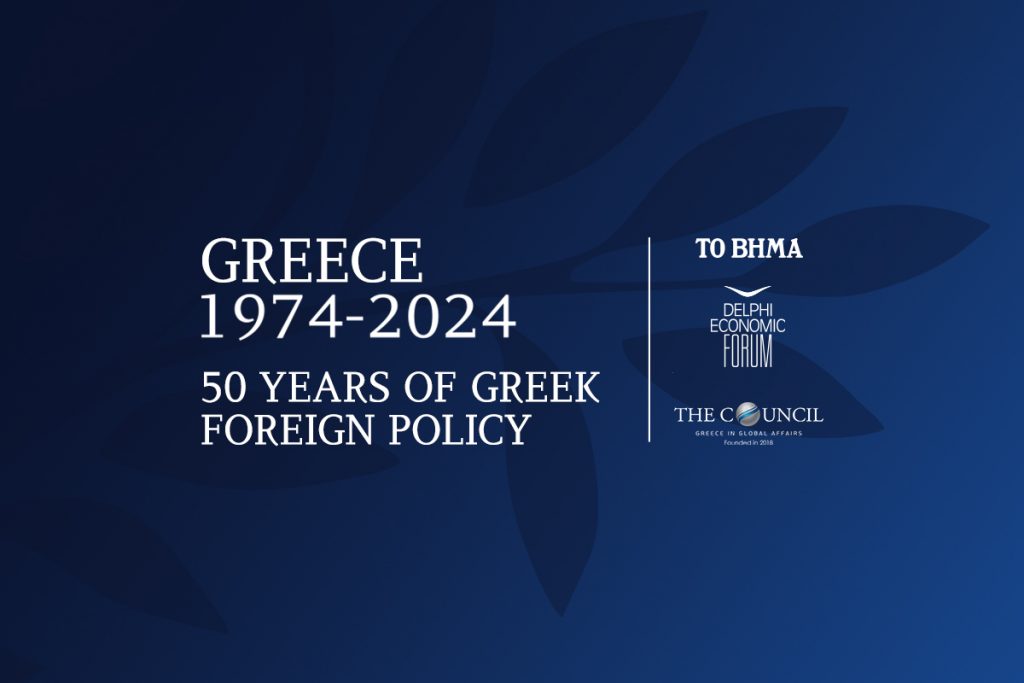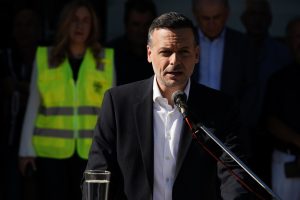NEW YORK—UnitedHealth Group’s annual investor day began much like any other corporate event. There was breakfast and then around 8 a.m. Wednesday the collection of investors, executives and Wall Street analysts filed into a capacious third-floor ballroom at the Hilton hotel in Midtown Manhattan to hear upbeat presentations about the company’s future.
Unbeknown to them, one of the company’s top executives had been killed earlier that morning on the street below in what police say was a targeted attack .
Brian Thompson, chief executive of UnitedHealthcare, the largest U.S. health insurer, had been steps from the Hilton’s entrance at 6:44 a.m. when an assassin wearing a dark hoodie and gray backpack stepped from behind a parked car in the predawn darkness, calmly pursued him for a few steps, and then shot him with a 9-millimeter pistol.
Thompson staggered, appeared to turn toward his pursuer, and then collapsed. The killer fled down an alley and then escaped on a bike, according to police.
Inside the conference room of one the city’s busiest hotels, the show went on. It wasn’t until around 9 a.m. that Andrew Witty , chief executive of UnitedHealth Group, UnitedHealthcare’s parent company, interrupted the proceedings to announce that the event was being canceled due to “a very serious medical situation with one of our team members.”
“And as a result, I’m afraid we’re going to have to bring to a close the event today,” he added. “I’m sure you’ll understand.”

A member of the NYPD Crime Scene Unit takes a picture of a shell casing found at the scene where the CEO of UnitedHealthcare Brian Thompson was reportedly shot and killed in Midtown Manhattan, in New York City, U.S., December 4, 2024. REUTERS/Shannon Stapleton
The news had already started to ripple through the crowd, according to people who were there. Nearly everyone with a mobile phone and a social-media account seemed to know what the medical emergency was. Within the hour, many of the attendees were in the Hilton lobby, luggage in tow, checking out.
Even for a city inured to shootings and macabre headlines, the killing of a star executive just before sunrise was stunning. It was all the more so because the shooting—which Jessica Tisch, the new New York Police Department commissioner, called “a brazen, targeted attack”—unfolded at the height of the holiday season in a Midtown Manhattan thronged with tourists admiring festive store windows, taking in the Rockettes show at Radio City Music Hall and the like.
The Christmas tree at Rockefeller Center, just a few blocks from the Hilton, was due to be lighted on Wednesday night. By midmorning, a crowd had formed by the skating rink to watch a rehearsal for the television event. Meanwhile, a short walk away, others were gathered behind yellow tape and metal barricades, gawking at investigators as they picked over the crime scene.
The 50-year-old Thompson, known to many as B.T. and whom one acquaintance described as having “a classic Midwestern executive vibe,” was visiting from Minnesota and was scheduled to speak at the company’s annual investor day conference. He had arrived in town on Monday and was staying at a hotel across the street from the Hilton.
In the healthcare industry, many were grappling with the loss of a friend and colleague—and the dissonance between a routine corporate event and a killing. The previous evening, Thompson had been among the UnitedHealth executives who hosted a dinner to welcome analysts and investors. “It struck people as surreal,” said John Ransom, an analyst at Raymond James.
Health insurance was Thompson’s path from rural Iowa to executive success. Yet some speculated that the much-reviled industry might have provided a motive for the killer—although the police released no information on the matter. UnitedHealthcare and other insurers are routinely inundated with lawsuits and complaints from enraged customers who complain that they have been unfairly denied medical coverage.
“There had been some threats,” Thompson’s wife, Paulette, told NBC News on Wednesday, adding: “Basically, I don’t know, a lack of coverage?”
He has also recently faced legal scrutiny. Thompson was one of three United executives named in a lawsuit from a Florida pension fund in May accusing the company of hiding a Justice Department antitrust investigation from shareholders while insiders sold stock—including $15 million in Thompson’s personally held shares. He hadn’t answered the claims in court before he was killed.
Thompson and Paulette had been living in separate homes less than a mile apart in suburban Maple Grove for several years, according to property records, voter registration data and neighbors. They had two sons.

Chief of Detectives Joseph Kenny speaks next to New York City Police Commissioner Jessica Tisch during NYPD press conference after the CEO of UnitedHealthcare Brian Thompson was reportedly shot and killed in Midtown Manhattan, in New York City, US, December 4, 2024. REUTERS/Mike Segar REFILE – QUALITY REPEAT
Jim Pitzner, another neighbor of Thompson’s in the Whistling Pines neighborhood, said the executive was often traveling.
The son of a worker in the local grain elevators, Thompson graduated from the University of Iowa. He joined UnitedHealth in 2004 and worked his way up the ranks. He had been appointed president of UnitedHealthcare in 2021 after leading its division that dealt with Medicare and Medicaid.
Antonio Ciaccia, who met Thompson around 2018 while serving as head of government affairs at the Ohio Pharmacists Association, described him as “uniquely affable, thoughtful and likable.”
He maintained respect for Thompson even though they were on opposite sides of the table when a trio of UnitedHealthcare executives flew to Ohio to try to mend fences after the state accused the company of overcharging for drugs.
Matt Burns, a former UnitedHealthcare communications executive who worked with Thompson, recalled him as a whip-smart, down-to-earth executive.
“He was…a relatable leader who you rooted for and you cheered for,” Burns said, crediting Thompson as one those behind for the company’s launch of so-called health navigators, who would guide patients through difficult times with their treatment.
The police departments in Maple Grove, where Thompson lived, and in Minnetonka, where UnitedHealth is based, both said they had received no complaints about threats to Thompson.
Minnetonka police did provide information about a protest at a UnitedHealth building in July. About 100 demonstrators participated and 11 were arrested for blocking a roadway, according to a police report. The People’s Action Institute, a social-justice organization, led the protest, claiming that UnitedHealth had a systemic practice of refusing to authorize or pay for care.
In April, more than a hundred protesters descended on the Minnesota headquarters of UnitedHealthcare’s parent company, UnitedHealth Group. They blasted the company for what they said was “an epidemic” of claims denials.
On Wednesday morning, one witness described the gun shots as sounding like a car door slamming. A hotel guest described hearing the sirens outside on Sixth Avenue.
Several security experts who watched video footage of the killing said the shooter appeared to handle the gun with skill. Joseph Kenny, the chief of detectives for the NYPD, declined to say when asked whether he believed the killer was a professional. But he noted the apparent ease with which he cleared a jam while firing the pistol. “It does seem he’s proficient in the use of firearms,” Kenny said.
“The shooter appeared to use a pistol equipped with a silencer,” said James Stejskal, a former Army Special Forces soldier and military historian who reviewed a video of the shooting for The Wall Street Journal. The shooter also appeared well trained in using the weapon, Stejskal said, exhibiting a good shooting stance and responding quickly when the gun briefly jammed.
Philip Klein, whose security firm has provided bodyguard services to Thompson in the past, said he was shocked that the executive didn’t have personal security with him at the time of the shooting.
“It was normal operation for that company that they would have their own private security team to take care of their corporate executives,” said Klein, who is owner of Klein Investigations and Consulting in Nederland, Texas. He said his company provided protection services to Thompson a few times between 2000 and 2009.
By 9 a.m., when a man who works at the 24-hour newsstand directly in front of the Hilton on Sixth Avenue arrived for his shift, nothing appeared out of the ordinary, he said.
Hilton’s side door on 54th Street told a different story. Police tape, metal guardrails and orange cones blocked anyone from entering the building. Television-crew vans lined both sides of the street. A police officer mounted on a horse stood nearby, staring ahead at the hotel’s entrance.
Tourists went about their business. Markus Ringler, visiting from Germany with his family, heard about the shooting from a relative back home. “We don’t think it’s good that somebody got killed but it doesn’t affect or change anything in our plans,” Ringler said, standing on a plaza overlooking the unlit Rockefeller Center tree.
Police later released images—taken before the shooting—showing the suspect standing in front of the counter at a Starbucks on Sixth Ave near the Hilton. He was wearing the same backpack and his face was obscured by a mask and a hood.’
More than 1,000 miles away, Maple Grove police arrived at the home of Thompson’s wife at 8:23 a.m. central to notify her of the death.
“Brian was a wonderful man and a wonderful father,” said Maria Reveiz, one of Thompson’s sisters-in-law. Reveiz had just arrived in Egypt to help Gazan refugees when she got a text from another sister with the news. “We are shocked and heartbroken,” Reveiz said.
By late Wednesday morning at the UnitedHealthcare campus in Minnetonka, the company had lowered its flags to half-staff.
Write to Joshua Chaffin at joshua.chaffin@wsj.com and Andrew Tangel at andrew.tangel@wsj.com


